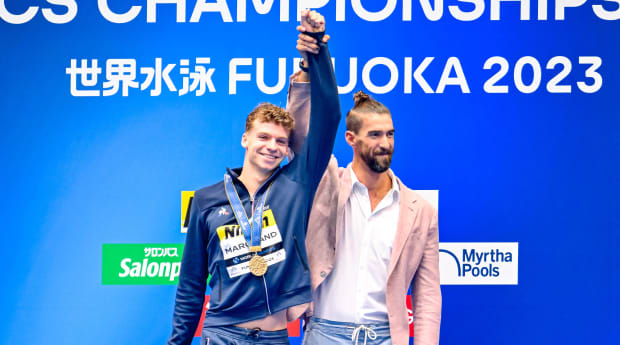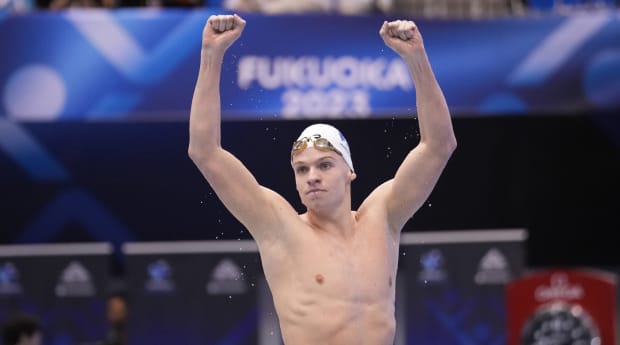Dethroned but gracious, Michael Phelps stood and applauded the man who erased him from the record book. Later, he placed a gold medal around Léon Marchand’s neck, posed for pictures with him and lifted his arm in the air, like a defeated boxer acknowledging his vanquisher.
Marchand’s reaction on a live Peacock broadcast, after seeing that he had annihilated the last individual world record of the greatest swimmer ever: “What the f--- is happening?”
Marchand spoke for many of us in that moment. How did we get here? How did we reach a point where someone could swim the 400-meter individual medley in 4:02.50, destroying the GOAT’s world record by 1.34 seconds?

IMAGO/Insidefoto
How, beyond the tyranny of time and the relentless advance of technique and training, did we reach a point where Michael Freaking Phelps is no longer the fastest human ever in the hardest swimming event? This is a distinction he’d held without interruption since 2002, which in June broke the mark for longest-held swimming world record by the same person. Phelps first set the record at age 17, then bettered it seven times. The final duration of his ownership: 20 years and 342 days.
The short answer to how we got here is Bob Bowman. He’s the connective thread from Phelps to Marchand, a 21-year-old from Toulouse, France, who swims for Bowman at Arizona State. Bowman is the godfather of 400-meter IM training. He’s also Phelps’s lifetime coach and father figure—and he just played a hand in pushing Phelps’s career further into the past.
Awkward.
Seeing this momentous changing of the guard coming, I asked Bowman last month how Phelps was handling his former coach leading the assault on his legacy. His answer: “It’s not a problem now that Michael has the longest record ever. We thought that [Marchand] might break it [at French national trials before Phelps had the longevity record], and that would be a thing. Michael knows he’s good enough to do it. It won’t be a shock.”
For 14 years, it would have been a shock. This was inconceivable until 2022, when it rushed suddenly into focus: Marchand blew everyone away at the World Championships in Budapest, coming within half a second of Phelps’s previously unassailable mark of 4:03.84, the performance that launched Phelps’ eight-gold-medal tour de force at the Beijing Olympics. When Marchand backed up that breakout 2022 meet with a ridiculous NCAA championships in March, smashing three records, the countdown to this day was on.
The combination of Bowman’s relentless training and Marchand’s uncanny feel for the water and athleticism brought him to the brink of history. Marchand is not an extraordinary physical specimen to look at, but he’s mastered the one thing that has changed the game the most in the 21st century: underwater breakouts on starts and turns.
Phelps described the evolution of that dynamic well on the Peacock broadcast Sunday. He credited Australian freestyle legend Ian Thorpe with changing the sport with his underwaters, then noted that he and Ryan Lochte improved upon it. “He’s taken it to another level,” Phelps said of Marchand. “Léon’s just learned from all of us.”
In the 400 IM preliminaries (Saturday night in the U.S., Sunday in Japan), Marchand was out through the butterfly and backstroke legs ahead of Phelps’s world-record pace. That was significant, because Marchand’s best stroke is breaststroke. But Marchand all but shut down through the breast and the closing freestyle, coasting in at 4:10, seeded second for finals to American Carson Foster.
Nobody was fooled into thinking Foster or anyone else had a chance. Marchand was racing against history—and in a riveting plot twist, Phelps was on the broadcast to analyze this threat to his primacy.
Before the race, Phelps said Marchand would have to navigate the first 300 meters faster than 3:07 to break the record—Phelps’s closing 56.79 on the freestyle leg in ’08 was a split Marchand could not replicate. When Marchand turned from breaststroke to freestyle, the clock fairly screamed what was happening: 3:04.28.
“Uh-oh,” Phelps said on-air. “It’s gone.”
Phelps spent the last 100 meters of the race lauding Marchand, who figures to win two more golds at these World Championships (200 IM and 200 breaststroke). Phelps lives in Scottsdale, Ariz., and has carte blanche to attend Arizona State workouts, so he’s seen Bowman’s latest prodigy in action many times. Nobody more readily recognizes what can happen with the right combination of individual talent, coaching acumen and the sport’s evolution.
“I think this kid has the potential to break four minutes,” Phelps declared. What once seemed impossible now seems attainable. With the Paris Olympics in Marchand’s home country next year, he will be the biggest star of those Summer Games and his pursuit of that barrier will be a main storyline.

Eugene Hoshiko/AP
All that said, it feels surreal for Phelps to have no more individual world records. (His 400 freestyle relay record from ’08, swimming alongside Garrett Weber-Gale, Cullen Jones and heroic anchor Jason Lezak, still stands.) So does an 800 free relay from ’09 with Lochte, Ricky Berens and David Walters. Those of a certain age, who were captivated by him so many summer nights during Olympics past, are entitled to feel a little old and sad today.
Phelps’s cumulative accomplishments are unassailable—28 Olympic medals, 23 of them gold, both records—so it’s jarring to consider how far the sport has come. Can you really have a record book without him?
He was a phenom as a 15-year-old Olympian. A force as a 19-year-old, winning six gold medals and eight overall in Athens. He was Poseidon in Beijing four years later, the greatest thing anyone had ever seen in water. Older and wrestling with some demons, Phelps still won four golds and two silvers in London in 2012. Then he was the elder statesman who authored a near-perfect ending in ’16, going out with five golds and one silver.
The world records are gone now. The legacy endures. Watching Phelps pass the baton to Marchand reinforced the greatness of them both.







